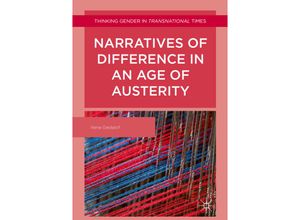This book traces the narrative strategies framing austerity policies through an illuminating
analysis of policy documents and political discourses exposing the political consequences for
women racialized minorities and disabled people. While many have critiqued the ways in which
austerity has captured the contemporary political narrative this is the first book to
systematically examine how these narratives work to shift the terms within which policy debates
about inequality and difference play out. Gedalof's exceptional readings of these texts pay
close attention to the formal qualities of these narratives: the chronologies they impose
their articulation of crisis and resolution the points of view they construct and the
affective registers they deploy. In this manner she argues persuasively that the differences of
gender race ethnicity and disability have been stitched into the fabric of austerity as
excesses that must be disavowed as reproductive burdens that are too great for the austere
state to bear. This innovative intersectional analysis will appeal to students and scholars of
social policy gender studies politics and public policy.



